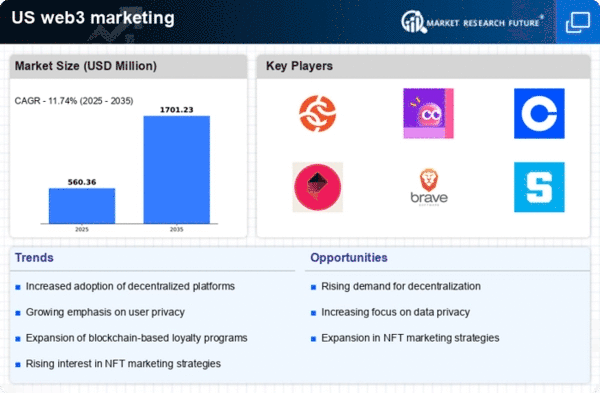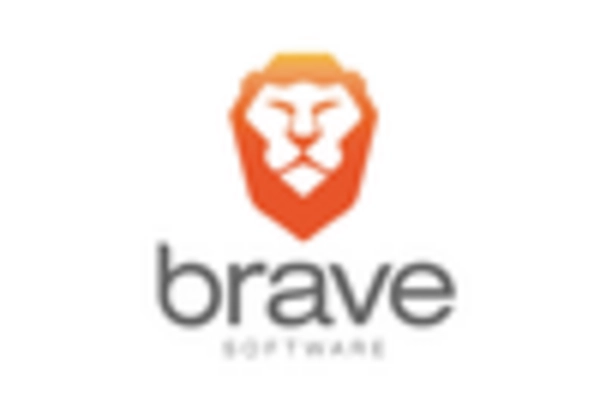Growth of Token-Based Incentives
Token-based incentives are becoming a prominent feature in the web3 marketing market, as businesses seek innovative ways to engage customers. By offering tokens as rewards for specific actions, companies can foster loyalty and encourage user participation. In the US, the adoption of token-based marketing strategies has increased, with reports indicating that around 40% of businesses are implementing such programs. This trend highlights the potential for tokens to create a more interactive and rewarding customer experience. The web3 marketing market is witnessing a shift towards gamification, where brands utilize tokens to incentivize behaviors such as referrals, purchases, and social media engagement. As consumers become more familiar with token economies, the effectiveness of these incentives is likely to grow, further driving engagement and brand loyalty in the web3 marketing market.
Rise of Community-Driven Marketing
Community-driven marketing is gaining traction within the web3 marketing market, as brands recognize the value of building strong relationships with their audiences. This approach emphasizes collaboration and engagement, allowing consumers to feel more connected to the brands they support. In November 2025, it is observed that approximately 50% of marketing campaigns in the US incorporate community-driven elements. This trend suggests a shift away from traditional marketing tactics towards more participatory strategies. The web3 marketing market is leveraging social media platforms and decentralized communities to foster dialogue and feedback, enhancing brand authenticity. By prioritizing community engagement, brands can cultivate a loyal customer base that actively advocates for their products. As this trend continues to evolve, community-driven marketing is likely to play a crucial role in shaping the future landscape of the web3 marketing market.
Integration of Artificial Intelligence
The integration of artificial intelligence (AI) into marketing strategies is emerging as a transformative force within the web3 marketing market. AI technologies enable marketers to analyze vast amounts of data, providing insights that can enhance targeting and personalization. In November 2025, it is estimated that AI-driven marketing solutions account for approximately 30% of the overall marketing budget in the US. This trend suggests that businesses are increasingly recognizing the value of AI in optimizing their marketing efforts. The web3 marketing market is leveraging AI to create more engaging and relevant content, thereby improving customer experiences. Additionally, AI can facilitate real-time decision-making, allowing marketers to respond swiftly to changing consumer preferences. As AI technology continues to advance, its role in the web3 marketing market is expected to expand, potentially reshaping how brands connect with their audiences.
Emergence of Decentralized Applications
The rise of decentralized applications (dApps) is reshaping the web3 marketing market. These applications leverage blockchain technology to provide users with enhanced security and transparency. As of November 2025, the number of dApps has surged, with estimates suggesting over 4,000 active dApps in the US alone. This proliferation indicates a growing consumer interest in decentralized solutions, prompting marketers to adapt their strategies accordingly. The web3 marketing market is witnessing a shift towards promoting dApps, as businesses seek to engage users through innovative platforms. Furthermore, the integration of dApps into marketing campaigns allows for more personalized user experiences, potentially increasing customer loyalty and retention. As dApps continue to evolve, they are likely to play a pivotal role in shaping the future of marketing strategies within the web3 marketing market.
Consumer Demand for Privacy and Security
In an era where data breaches and privacy concerns dominate headlines, consumer demand for privacy and security is a critical driver in the web3 marketing market. As individuals become more aware of their digital footprints, they are gravitating towards platforms that prioritize user privacy. This trend is particularly pronounced in the US, where a survey indicates that approximately 70% of consumers prefer brands that offer transparent data practices. Consequently, marketers in the web3 marketing market are increasingly focusing on privacy-centric strategies, utilizing blockchain's inherent security features to build trust with consumers. This shift not only enhances brand reputation but also aligns with regulatory expectations, as compliance with data protection laws becomes paramount. As privacy concerns continue to escalate, the web3 marketing market is likely to see a surge in demand for solutions that prioritize user data protection.
















